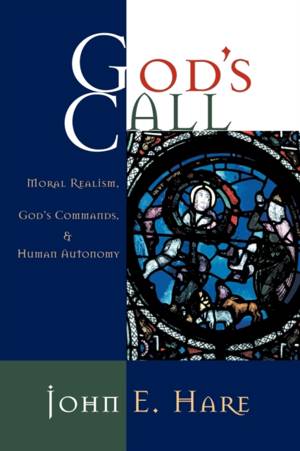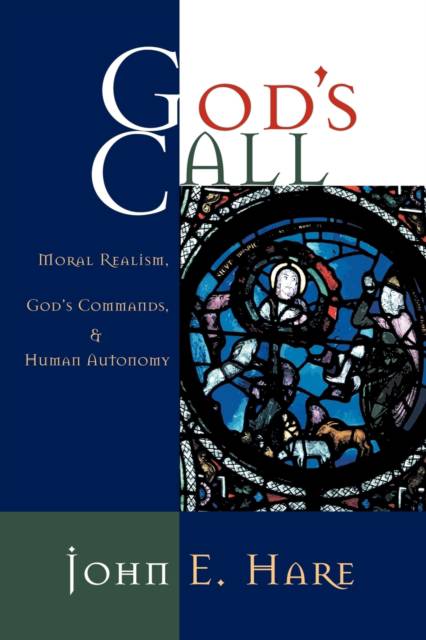
- Retrait gratuit dans votre magasin Club
- 7.000.000 titres dans notre catalogue
- Payer en toute sécurité
- Toujours un magasin près de chez vous
- Retrait gratuit dans votre magasin Club
- 7.000.0000 titres dans notre catalogue
- Payer en toute sécurité
- Toujours un magasin près de chez vous
27,95 €
+ 55 points
Description
First Things
"This book by John E. Hare . . . is full of stimulating ideas that call for elaboration. Hare takes on important arguments of our day while doing historical philosophy. . . Those with some training in theological ethics will find Hare's reflections on enduring moral questions to be a welcome stimulus to deeper thinking." Theological Studies
"Lucidly written and crisply illustrated, Hare's philosophy of prescriptive realism provides an attractive version of divine-command ethics, shorn of its traditional heteronomy, even if it will not completely satisfy Christians beholden to a more genteel account of human concupiscence." Robert C. Roberts
"John Hare uses the history of philosophy in three separate centuries to construct a compelling account of moral authority that preserves the objectivity of moral norms, clarifies the autonomy of moral agents, and places God at the center. Hare offers an original interpretation of metaethics in the twentieth century, restores Immanuel Kant as a Christian moral philosopher, and introduces us to the searching divine command ethics of John Duns Scotus. This short book brims with provocative insights for contemporary ethics." Gene Outka
"This volume offers a wide range of important arguments. Its three chapters show striking precision and concision. John Hare first considers debates within Anglo-American philosophy over the last century between moral realists and moral expressivists. He seeks to hold together the objective and subjective sides of evaluation and to defend prescriptive realism. Next he goes back to John Duns Scotus in the later Middle Ages in order to retrieve parts of Scotus's divine command theory. Thus he resists making natural law the only theist alternative to secular ethical theories. Finally he critically examines relevant claims in Immanuel Kant, who stands influentially between the medieval and contemporary standpoints. He contends that Kant does not attack divine command theory without further ado, as most contemporary interpreters suppose. These are engaging arguments indeed. Hare displays wide reading in the primary and secondary literature. His style is lean and accessible. This book merits and rewards serious scrutiny, and I commend it with enthusiasm." Robert Audi
"This book is both historically well informed and full of insights. It contains a valuable presentation of Duns Scotus's divine command theory, an informative treatment of Kant's position on autonomy in relation to divine authority, and much else of major interest." Booklist
"Hare's brief book provides an informative history of one major controversy in twentieth century ethics, that between moral realists and moral expressivists. . . The controversy at its heart is a live one in ethics and of particular concern to theological descendants of Calvin and to those concerned with natural law in Catholic moral theology."
"This book by John E. Hare . . . is full of stimulating ideas that call for elaboration. Hare takes on important arguments of our day while doing historical philosophy. . . Those with some training in theological ethics will find Hare's reflections on enduring moral questions to be a welcome stimulus to deeper thinking." Theological Studies
"Lucidly written and crisply illustrated, Hare's philosophy of prescriptive realism provides an attractive version of divine-command ethics, shorn of its traditional heteronomy, even if it will not completely satisfy Christians beholden to a more genteel account of human concupiscence." Robert C. Roberts
"John Hare uses the history of philosophy in three separate centuries to construct a compelling account of moral authority that preserves the objectivity of moral norms, clarifies the autonomy of moral agents, and places God at the center. Hare offers an original interpretation of metaethics in the twentieth century, restores Immanuel Kant as a Christian moral philosopher, and introduces us to the searching divine command ethics of John Duns Scotus. This short book brims with provocative insights for contemporary ethics." Gene Outka
"This volume offers a wide range of important arguments. Its three chapters show striking precision and concision. John Hare first considers debates within Anglo-American philosophy over the last century between moral realists and moral expressivists. He seeks to hold together the objective and subjective sides of evaluation and to defend prescriptive realism. Next he goes back to John Duns Scotus in the later Middle Ages in order to retrieve parts of Scotus's divine command theory. Thus he resists making natural law the only theist alternative to secular ethical theories. Finally he critically examines relevant claims in Immanuel Kant, who stands influentially between the medieval and contemporary standpoints. He contends that Kant does not attack divine command theory without further ado, as most contemporary interpreters suppose. These are engaging arguments indeed. Hare displays wide reading in the primary and secondary literature. His style is lean and accessible. This book merits and rewards serious scrutiny, and I commend it with enthusiasm." Robert Audi
"This book is both historically well informed and full of insights. It contains a valuable presentation of Duns Scotus's divine command theory, an informative treatment of Kant's position on autonomy in relation to divine authority, and much else of major interest." Booklist
"Hare's brief book provides an informative history of one major controversy in twentieth century ethics, that between moral realists and moral expressivists. . . The controversy at its heart is a live one in ethics and of particular concern to theological descendants of Calvin and to those concerned with natural law in Catholic moral theology."
Spécifications
Parties prenantes
- Auteur(s) :
- Editeur:
Contenu
- Nombre de pages :
- 136
- Langue:
- Anglais
Caractéristiques
- EAN:
- 9780802849977
- Date de parution :
- 31-07-01
- Format:
- Livre broché
- Format numérique:
- Trade paperback (VS)
- Dimensions :
- 152 mm x 229 mm
- Poids :
- 208 g

Les avis
Nous publions uniquement les avis qui respectent les conditions requises. Consultez nos conditions pour les avis.






